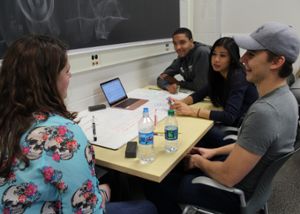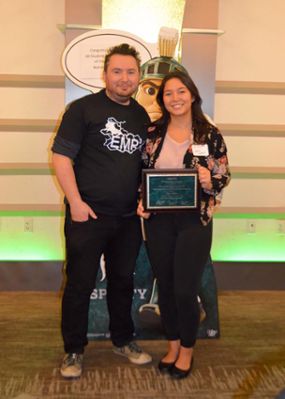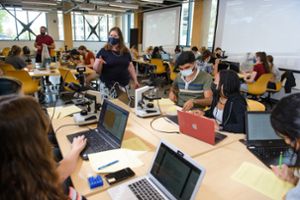MSU recognized for physics undergraduate education excellence
Michigan State University’s Department of Physics and Astronomy was recognized by the American Physical Society (APS) with a prestigious 2022 Award for Improving Undergraduate Physics Education.

MSU undergraduate physics curriculum stood out for making significant improvements to its undergraduate educational experience and its ability to retain a high number of successful physics majors. Students, faculty, and staff put countless hours into reforming the department’s introductory courses and integrating computation across its curriculum.
"The interconnection between research and teaching and the drive to excel at both is at the heart of the land grant mission of MSU,” said Steve Zepf, professor and chair of the Department of Physics and Astronomy. “This department has a long history of innovation and success in its teaching and research missions. Its faculty are both top-ranked researchers making discoveries in many different fields of physics and astronomy, and developers and teachers of innovative curricula.”
The transformation of introductory physics courses at MSU has been ongoing for almost a decade. In 2014, Danny Caballero, Lappan-Phillips Associate Professor of Physics Education, and Paul Irving, assistant professor of physics education, re-designed the first introductory mechanics physics classroom, known as (P-Cubed). Instead of one professor lecturing, they created a group-based classroom where students learn from a community of teachers. Caballero and Irving demonstrated that this model was scalable and sustainable, taking P-Cubed from a 40-person class to three sections of 120 students, and the numbers are still growing.
“One of the primary threads of my research is how students develop an understanding of physics through computing and how they develop and understand computing through physics,” Caballero said. “There were no contexts to do that kind of research when I came to MSU in 2013.”

“We have evidence that students are developing a more complete understanding of the physics concepts that they’re getting in the classroom,” Irving said. “We are also changing their attitudes toward science—and physics in particular—and we’re emphasizing skills that will be important to them in the future, especially the emphasis on group work and computation.”
P-Cubed’s success catalyzed further change. Caballero, Irving and Daryl McPadden, assistant professor of physics education research, used the P-Cubed model to transform the course, Electricity and Magnetism Projects and Practices in Physics (EMP-Cubed), from one that provided content to one that prepares students for joining the STEM workforce. In the Fall of 2017, they piloted a section of 40 students and five teaching staff. The course has since grown to three sections of 270 students and 20 teaching staff.
“This course allows us to spend our class and instruction time helping students develop the scientific skills that they will need for their future careers,” McPadden said. “We have specifically designed mechanisms in these courses to provide students with weekly feedback and strategies for improving their skills.”
Physical Review Physics Education Research published multiple articles on MSU’s physics course improvements, and the new curriculum has earned teaching awards at the department, college, and university levels. Early studies show that students taking the newly designed classes are understanding concepts better and have more positive attitudes towards physics.

For almost six years, Lisa Lapidus, professor of experimental biophysics, has been working with her team on the new physics life science curriculum.
“Switching the teaching modes to active learning requires a lot of planning and preparation in terms of classroom space, equipment, and staffing,” Lapidus said. “It took the effort of many people to make it all happen, so this recognition means a lot for everyone in the department.”
Catherine Crouch, chair of the APS Committee on Education stated that MSU’s Department of Physics and Astronomy can serve as a model for other large public institutions.
Along with MSU, the 2022 Award for Improving Undergraduate Physics Education went to Colgate University, Howard University, and Rowan University. In addition to a plaque, awardees will be recognized for three years on the APS website and will be publicly honored at its April meeting in New York City during the Education and Diversity Reception.
Banner image: Students attempting to figure out the direction of a B-Field for “Design your own problem day” in EMP-Cubed classroom. Credit: Bailey Lundholm